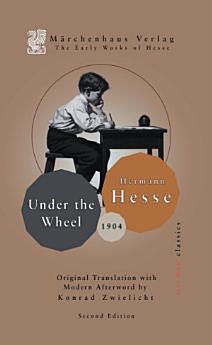Under the Wheel
The Early Works of Hermann Hesse Buch 1 · Marchen Press
E-Book
349
Seiten
family_home
Zulässig
info
reportBewertungen und Rezensionen werden nicht geprüft Weitere Informationen
Über dieses E-Book
Set in a repressive Württemberg seminary, this autobiographical novel follows his essay The Art of Idleness and later novel Knulp and excoriates educational systems that crush youthful vitality. Published by S. Fischer Verlag, it follows Hans Giebenrath’s psychological disintegration under paternal and pedagogical pressures, his tragic fate underscoring the dehumanizing effects of institutionalized ambition. This is deeply autobiographical, as Hesse did not enjoy school or the educational system at all. The narrative’s unsparing critique of authoritarianism drew controversy, with critics accusing Hesse of undermining educational discipline. Under the Wheel remains a seminal indictment of pedagogical brutality, its portrayal of adolescent despair echoing contemporaneous Freudian theories of repression. The novel’s austere prose and unrelenting pessimism mark a departure from Hesse’s earlier romanticism, signaling his shift toward socially engaged literature. Modern educators still grapple with its warnings about the costs of intellectual regimentation. Though Beneath the Wheel did not attain the same immediate popularity as Peter Camenzind, it solidified Hesse’s standing in German literature and has since become a classic in its own right. Its frank examination of the harms of academic overdrive was ahead of its time, resonating with generations of readers (especially students) who feel similarly “under the wheel” of expectation. This new edition features an original translation of Hesse's early work, making his philosophical, existentialist literature accessible to modern readers from the original Fraktur manuscripts. Enhanced by an illuminating Afterword focused on Hesse's personal and intellectual relationship with Carl Jung, a concise biography, a glossary of essential philosophical terms integral to his writings (his version of Jungian Psychological concepts) and a detailed chronology of his life and major works, this robust edition introduces the reader to the brilliance of his literature in context. It not only captures the depth and nuance of Hesse’s thought but also highlights its enduring impact on the debates of the mid-20th century, contemporary culture and Western Philosophy across the 20th and into the 21st century.
Autoren-Profil
Herman Hesse (1877-1962) navigated a life shaped by psychological turbulence that fundamentally transformed his literary vision following his pivotal encounter with Carl Jung's analytical psychology. After suffering a severe breakdown in 1916 amid his crumbling first marriage and the ravages of World War I, Hesse underwent intensive psychoanalysis with Jung's student J.B. Lang and later with Jung himself, sessions that would profoundly alter his creative trajectory. This Jungian influence became evident in his subsequent works, particularly "Demian" and "Steppenwolf," where the protagonist's journey toward individuation—Jung's concept of integrating the conscious and unconscious aspects of personality—emerges as a central theme. Hesse's correspondence with Jung continued for decades, their intellectual relationship deepening as Hesse increasingly incorporated Jungian archetypes, dream symbolism, and the notion of the shadow self into his narratives of spiritual seeking. The writer later acknowledged that Jung's therapeutic methods had not only rescued him from psychological collapse but had fundamentally reshaped his understanding of human consciousness, enabling him to transmute his personal suffering into the allegorical quests for wholeness that characterized his most enduring works.RetryClaude can make mistakes. Please double-check responses.
Dieses E-Book bewerten
Deine Meinung ist gefragt!
Informationen zum Lesen
Smartphones und Tablets
Nachdem du die Google Play Bücher App für Android und iPad/iPhone installiert hast, wird diese automatisch mit deinem Konto synchronisiert, sodass du auch unterwegs online und offline lesen kannst.
Laptops und Computer
Im Webbrowser auf deinem Computer kannst du dir Hörbucher anhören, die du bei Google Play gekauft hast.
E-Reader und andere Geräte
Wenn du Bücher auf E-Ink-Geräten lesen möchtest, beispielsweise auf einem Kobo eReader, lade eine Datei herunter und übertrage sie auf dein Gerät. Eine ausführliche Anleitung zum Übertragen der Dateien auf unterstützte E-Reader findest du in der Hilfe.











